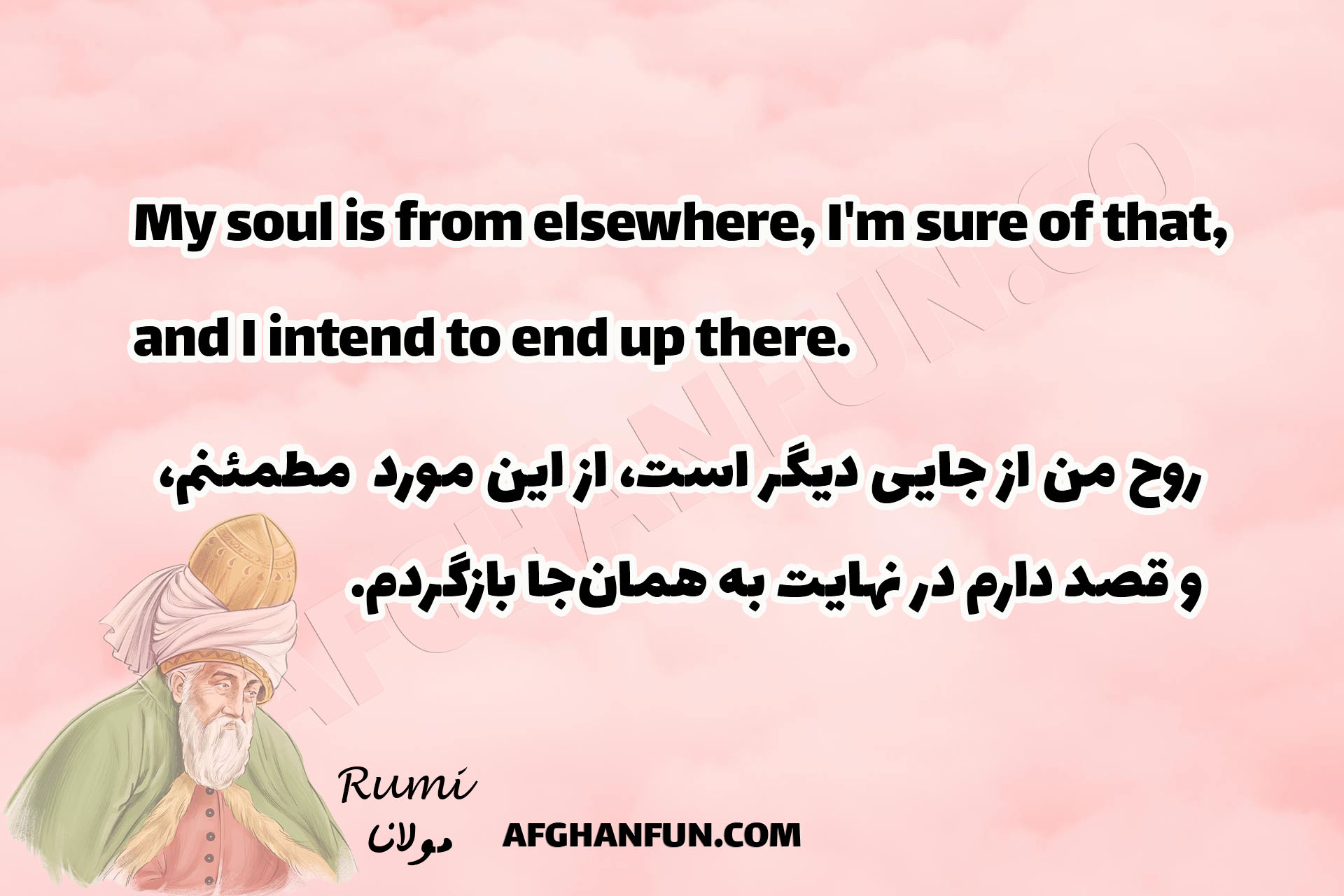Understanding Rumi’s Perspective on the Soul
My soul is from elsewhere, I’m sure of that, and I intend to end up there.
Rumi
روح من از جایی دیگر است، از این مورد مطمئنم، و قصد دارم در نهایت به همانجا بازگردم.
مولانا
این بیت از مولانا به زیبایی حس گسستگی روح انسان از جهان مادی و تمایل ذاتی آن به بازگشت به منبع اصلی خود را بیان میکند. مفاهیم کلیدی در این بیت عبارتند از:
روح: نماد بخش غیرمادی و جاودان انسان است.
جای دیگر: اشاره به دنیای معنوی و منبع اصلی وجود انسان دارد.
برگشت: نشاندهنده تمایل ذاتی انسان به بازگشت به خانه اصلی خود است.
مولانا با این بیت، به انسان یادآور میشود که زندگی دنیوی تنها بخشی از وجود اوست و ریشههای او در جای دیگری نهفته است. این بیت، حس جستجو و معنویت را در انسان برمیانگیزد و او را به سوی کشف حقیقت و معنای زندگی سوق میدهد.
Ҷони ман аз ҷои дигар аст, ман аз ин бовар дорам ва мехоҳам ба он ҷо баргардам.
МАВЛОНО ҶАЛОЛУДДИН МУҲАММАДИ БАЛХӢ
Ин байти Мавлоно ба зебоӣ ҳисси ҷудоӣ рӯҳи инсон аз олами моддӣ ва майли фитрии он ба баргаштан ба манбаи аслии худро ифода мекунад. Мафҳумҳои калидӣ дар ин байт иборатанд аз:
Ҷон: рамзи қисми ғайри моддӣ ва ҷовидмони инсон аст.
Ҷои дигар: ба олами маънавӣ ва манбаи аслии вуҷуди инсон ишора мекунад.
Баргаштан: нишондиҳандаи майли фитрии инсон ба баргаштан ба хонаи аслии худ аст.
Мавлоно бо ин байт ба инсон ёдрас мекунад, ки зиндагии дунёӣ танҳо як қисми вуҷуди ӯст ва решаҳои ӯ дар ҷои дигаре ниҳон аст. Ин байт, ҳисси ҷустуҷӯ ва маънавиятро дар инсон бедор мекунад ва ӯро ба сӯи кашфи ҳақиқат ва маънои ҳаёт ҳидоят мекунад.
وحي من من مكان آخر، أنا متأكد من ذلك، وأنا أعتزم أن أعود إلى هناك.
مولانا جلال الدین محمد الرومي
هذا البيت من شعر مولانا يعبر عن شعور الانسان بفصل روحه عن العالم المادي ورغبته الفطرية في العودة إلى مصدره الأصلي. المفاهيم الرئيسية في هذا البيت هي:
الروح: رمز الجزء غير المادي والخالد من الإنسان.
مكان آخر: يشير إلى العالم الروحي ومصدر وجود الإنسان الأصلي.
العودة: تدل على الرغبة الفطرية للإنسان في العودة إلى بيته الأصلي.
مولانا بهذا البيت يذكر الإنسان بأن الحياة الدنيوية ليست سوى جزء من وجوده وأن جذوره متأصلة في مكان آخر. هذا البيت يثير الشعور بالبحث والروحانية في الإنسان ويدفعه إلى اكتشاف الحقيقة ومعنى الحياة.
A Deep Dive into Rumi’s Verse
The Poem: “My soul is from elsewhere, I’m sure of that, and I intend to end up there.”
Themes and Interpretations
This verse by Rumi encapsulates a profound spiritual yearning and a sense of cosmic belonging. Let’s delve into the nuances:
- The Soul as a Traveler: The soul is not merely a part of the physical body but an eternal entity that has journeyed from a higher realm. This suggests a pre-existence of the soul, a belief common in many spiritual traditions.
- A Sense of Home: The “elsewhere” the soul is from is often interpreted as a spiritual homeland, a place of origin and ultimate return. This implies a longing for reunion with the divine or a higher consciousness.
- The Journey of Life: The phrase “I intend to end up there” indicates a purposeful journey, a conscious striving towards a spiritual destination. Life is seen as a pilgrimage, a temporary sojourn before returning to one’s true home.
- Transcendence of the Physical: By emphasizing the soul’s origins beyond the physical realm, Rumi invites readers to consider the limitations of material existence. The true self, according to this perspective, is spiritual and eternal.
- Universal Human Experience: While Rumi’s poetry often delves into Sufi mysticism, this particular verse resonates with people from diverse spiritual backgrounds. The longing for a higher purpose and the belief in a soul that transcends the physical body are universal human experiences.
Sufi Interpretations
Within the context of Sufi mysticism, this verse can be interpreted in several ways:
- Unity with the Divine: The “elsewhere” could refer to the state of unity with the divine, a state of perfect love and knowledge.
- The Soul’s Origin: The soul is seen as a particle of the divine, separated from its source for a temporary experience in the material world.
- The Journey of Return: The journey back to the “elsewhere” is the spiritual path, a process of purification and self-realization.
Psychological Implications
- Existential Questions: The poem invites contemplation of profound existential questions such as the meaning of life, the nature of consciousness, and our place in the universe.
- Search for Meaning: The longing for a higher purpose expressed in the verse can be seen as a universal human drive to find meaning and connection in life.
- Transcendence of Ego: By focusing on the soul’s origin beyond the ego, Rumi encourages a shift in perspective, away from the self and towards a more universal consciousness.
In Conclusion
Rumi’s verse offers a timeless exploration of the human soul and its connection to a higher reality. It invites readers to contemplate their own existence, their purpose in life, and their ultimate destination. Through the lens of Sufi mysticism, the poem offers a profound and inspiring message about the nature of reality and the human experience.
External links:
This Rumi poem, found on mindfulnessexercises











